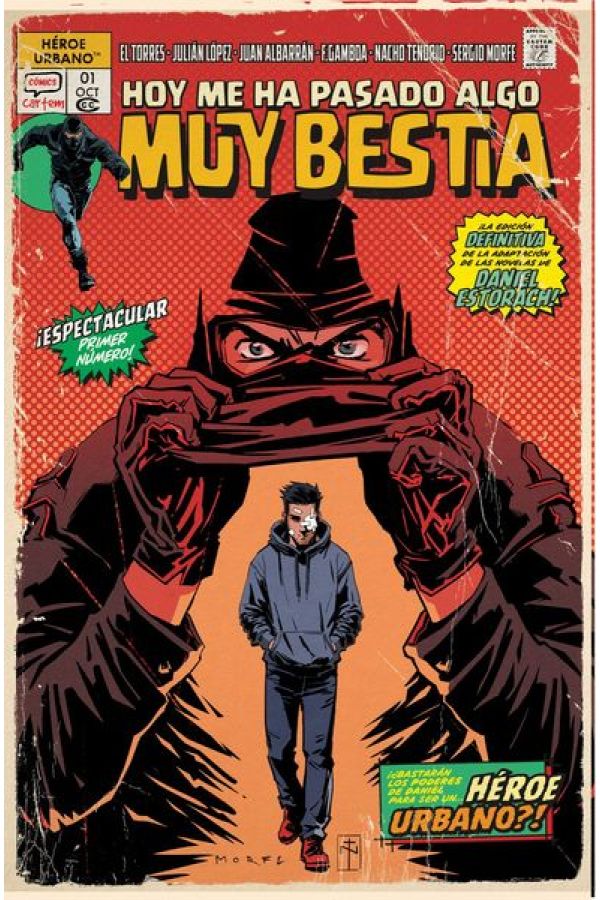Nacho terminó de leer Paracuellos de Carlos Giménez

Paracuellos por Carlos Giménez
EDICIÓN CONMEMORATIVA DEL 50.º ANIVERSARIO
2021: Mejor tebeo español de la historia, en la lista coordinada por Rockdelux.
…
Intento leer todo lo que puedo pero nunca es suficiente. Hay tanto que leer y tan poco tiempo...
Aficionado principalmente a los cómics y a la literatura de género (CiFi, fantasía, terror) pero no le hago ascos a nada.
También me puedes seguir en Mastodon en @nacho
Este enlace se abre en una ventana emergente
¡22% terminado! Nacho ha leído 11 de 48 libros.

EDICIÓN CONMEMORATIVA DEL 50.º ANIVERSARIO
2021: Mejor tebeo español de la historia, en la lista coordinada por Rockdelux.
…
Confieso, no sin cierta vergüenza, que aunque conocía la fama de esta obra nunca me decidía a leerla porque me dejaba llevar por el lugar común de "ya estamos con otra historia de postguerra". Una vez corregido ese error y leído este clásico indiscutible uno no puede dejar de preguntarse hasta qué punto ese tópico en realidad no es un constructo creado artificialmente por aquéllos que no quieren que recordemos que, entre otras cosas, hasta hace dos telediarios había en España niños encerrados en internados falangistas donde eran vejados más allá de lo imaginable. Pero Paracuellos no es revanchista, ni está movido por el odio aunque sí provoque una natural indignación. Paracuellos es memoria de unos supervivientes que no quieren victimizarse, pero que tampoco quieren que se olvide su historia.
Confieso, no sin cierta vergüenza, que aunque conocía la fama de esta obra nunca me decidía a leerla porque me dejaba llevar por el lugar común de "ya estamos con otra historia de postguerra". Una vez corregido ese error y leído este clásico indiscutible uno no puede dejar de preguntarse hasta qué punto ese tópico en realidad no es un constructo creado artificialmente por aquéllos que no quieren que recordemos que, entre otras cosas, hasta hace dos telediarios había en España niños encerrados en internados falangistas donde eran vejados más allá de lo imaginable. Pero Paracuellos no es revanchista, ni está movido por el odio aunque sí provoque una natural indignación. Paracuellos es memoria de unos supervivientes que no quieren victimizarse, pero que tampoco quieren que se olvide su historia.

Un origen superheroico distinto: como si Marvel hubiera nacido en Barcelona. No hay rascacielos de Manhattan, sino callejones del Raval; …
Cada vez que leo algún intento de adaptar los tropos superheroicos a un entorno español (con la honrosísima excepción de Súper López que juega su propia liga) siempre me quedo con una sensación de que hay algo que no termina de encajar. Esto no es excepción, a pesar de contar con El Torres que uno de mis guionistas nacionales favoritos. No creo que sea malo, simplemente no es para mí.

Mary tiene catorce años y su hermana Caroline, doce. Pero a veces siguen comportándose como niñas pequeñas, pues han recibido …

Estamos perdiendo nuestra capacidad de no hacer nada. Nuestra existencia está completamente absorbida por la actividad y, por lo tanto, …

Un origen superheroico distinto: como si Marvel hubiera nacido en Barcelona. No hay rascacielos de Manhattan, sino callejones del Raval; …

O idealista anano de case dous metros, Cenoria, entra na Garda da Noite da cidade de Ankh-Morpork, a máis grandiosa …
Aínda somos unha lingua minorizada pero polo menos xa podemos ler a Pratchett en galego grazas a Boadicea que está a facer un traballo salientábel coas súas traducións de clásicos de xénero (Dick, Le Guin, Miéville, Stephen King en breve...). Deste libro non hai moito que dicir, creo que é a cuarta vez que o leo e así a todo desfrutei del coma se fose a primeira. Por algo moitos achamos que esta é a mellor porta de entrada ao Mundodisco. Por certo, parabéns ao tradutor por nomear a Cut-Me-Own-Throat Dibbler como Evasivo Perdocartos. Marabilloso.

O idealista anano de case dous metros, Cenoria, entra na Garda da Noite da cidade de Ankh-Morpork, a máis grandiosa …

Incluye tomos 1 y 2 + cofre contenedor.
Un arca con inteligencia propia que lucha por conservar el ADN …
Una reflexión oscura y pesimista, pero no por ello menos cierta, del daño que las redes sociales algorítmicas y en general la digitalización excesiva de nuestra sociedad están causando no sólo a nuestras propias capacidades de atención y raciocinio sino que directamente es un ataque a la línea de flotación de las democracias. Un ensayo breve que seguro que resonará mucho a los que tenemos cuenta por estos lares.